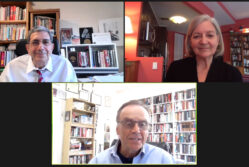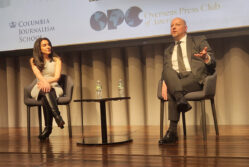Archive Event Highlight

Author Stephen Baker’s ‘Donkey Show’ Serves as an Accidental Modern Parable
by Chad Bouchard
Former foreign correspondent Stephen Baker told attendees at an OPC Book Night on June 9 that when he started writing his latest fiction novel decades ago, he did not intend it to be a metaphor for the world of confirmation bias, spin and selective information society has ended up creating.
Baker’s new novel, Donkey Show, is a crime thriller centered on Tom Harley, a cross-border journalist in El Paso, Texas, who receives a death threat in response to “lazy” reporting that involves a drug lord in Mexico. The incident propels the half-hearted journalist to untangle a deeper truth behind his story. Baker said though his journalist characters behave unethically in the book, he did not intend the book to be a critique of unscrupulous journalists.
“It’s a lot more interesting if people get into trouble. If people have a lie and they’ve built upon that lie, then they’re caught on that lie, it makes for all kinds of interesting conflict.”
He said the germ for the book concept came from a real story of a photojournalist in Juarez, Mexico who was abducted after taking photos of a hotel owned by a drug cartel. He was beaten and sent back over the border to El Paso to deliver a death threat to another journalist. Baker used the structure of this story to form the outline of his narrative, though key details were changed – namely that threatened journalist had fallen short of their professional integrity.
OPC Executive Director Patricia Kranz served as moderator. She asked Baker to explain the meaning of the title of the book, which stems from a known scam by Mexican taxi drivers who lure unwary tourists to see a show involving a sex act with a donkey, and then proceed to get them drunk at various bars where they get a kickback.
“It represents this myth of what people are ready to believe,” he said. In the book the drug lord is surrounded by sensational myths about his lifestyle and eccentricities “that he lives this life almost like 1,001 Nights.”
“In a larger sense, [the book title] reflects the myths that we accept about Mexico, or about any place in the world that we don’t know that well. We’re basically willing to believe what we’re told about it. If it’s convenient for us, if it feels good, we tend to believe it. And this is true regardless of whichever side of the political divide you’re on.”
He said when he wrote the first draft of the book many years ago, divisions in our information ecosystem were not as stark as today.
“We still had an accepted version of most facts, that most people in Congress, and in our society accepted and had differences in the margins. And now the differences are at the very essence of what we’re talking about. I didn’t write Donkey Show about that, but I think the metaphor holds.”
Baker has worked as a journalist and writer in many cities, including Paris, Mexico City, Caracas, Quito, Madrid, New York, and El Paso. He wrote non-fiction books about the effects of technology on society, including The Numerati and Final Jeopardy: Man vs. Machine and The Quest to Know Everything.
Kranz asked Baker to discuss one of the book’s characters, a reporter who isn’t very well informed but also isn’t afraid to ask “dumb” questions.
“One thing in journalism that holds a lot of us back, including me, is a reluctance to look stupid,” he said. “You have to be ready to look stupid because you have to ask those questions. Because a lot of times you don’t ask dumb questions, and then there’s a big hole in the middle of the story because you missed something you don’t understand.”
Baker said he did not know how the book would turn out while he was writing it. He usually just writes 1,000 words a day, knowing he could later cut things he didn’t like or move sections around during revision.
“You have to make yourself do it and be resigned to the fact that some of it is going to be no good, and you have to throw that out,” he said.
Baker and colleagues from BusinessWeek won the OPC’s Morton Frank Award in 1992 for a story about Mexico’s role in North American manufacturing.
Click the window below to watch a playlist of video clips from the program on YouTube.



